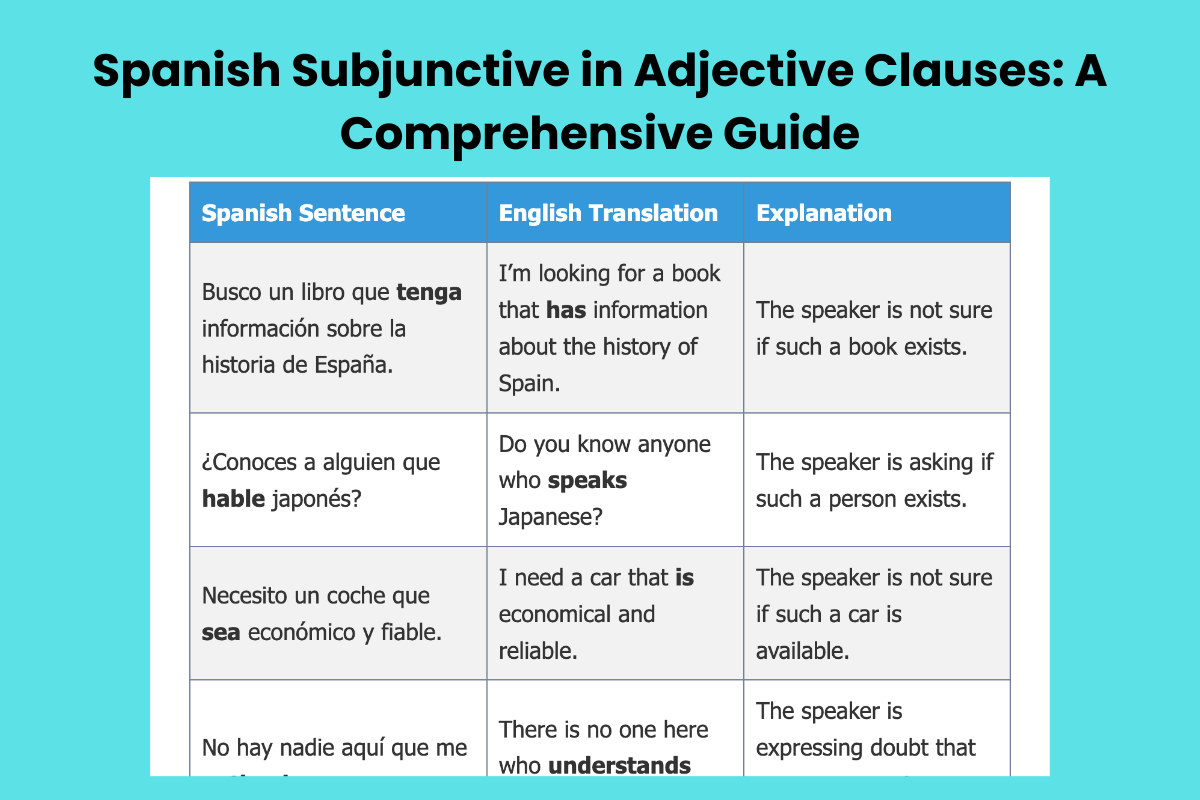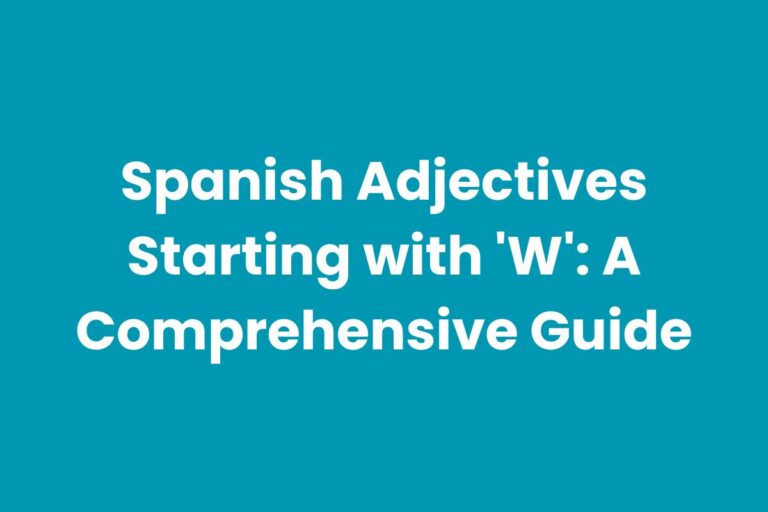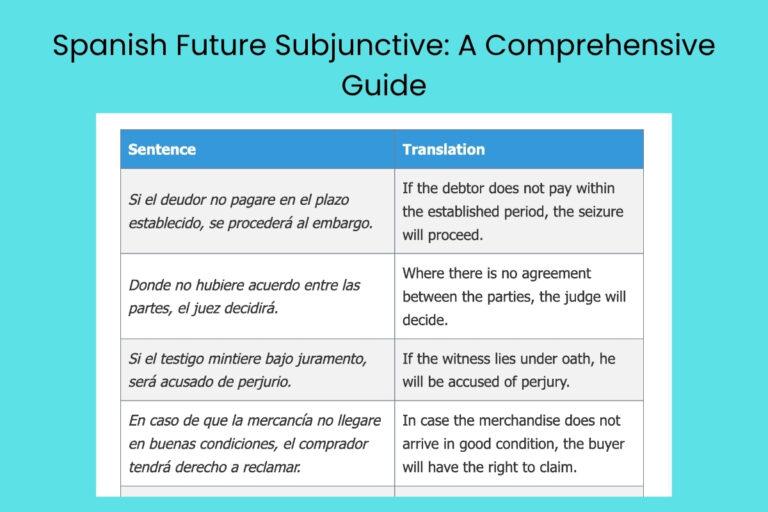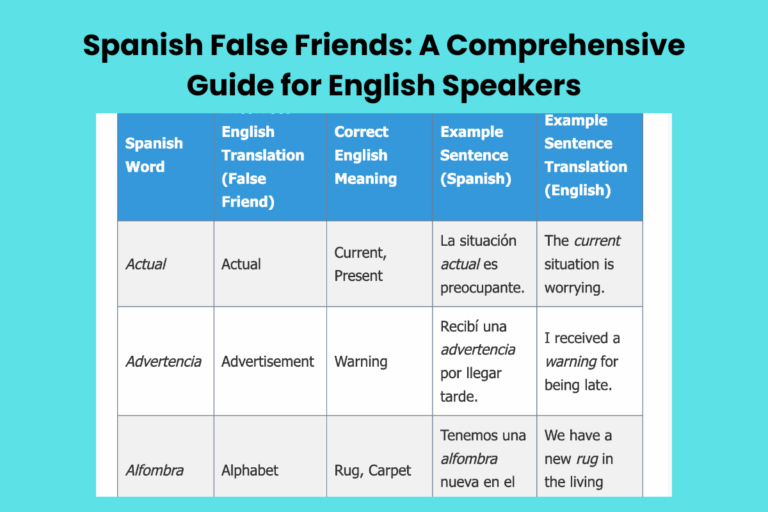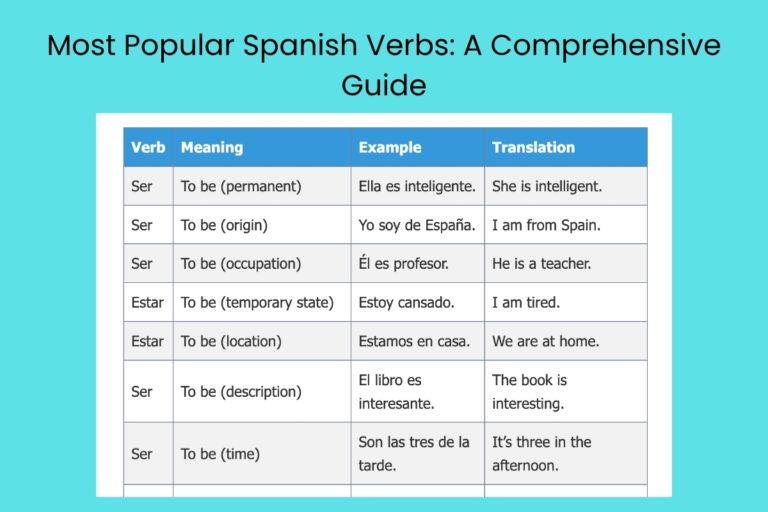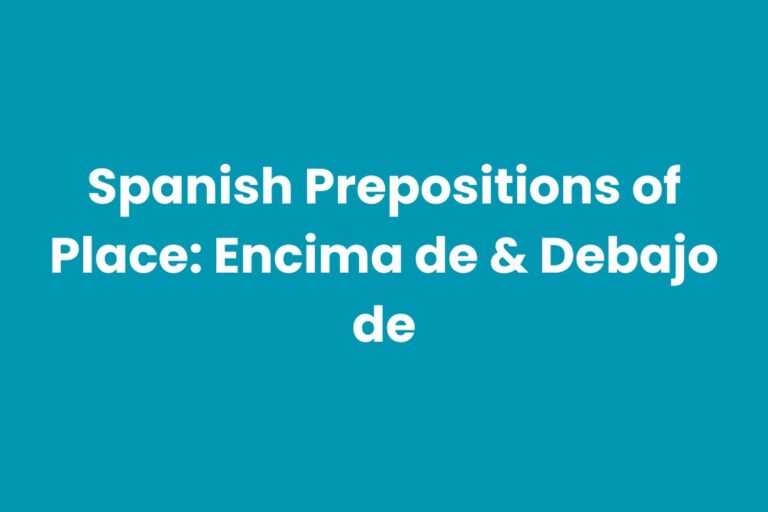Spanish Subjunctive in Adjective Clauses: A Comprehensive Guide
Mastering the Spanish subjunctive mood is crucial for fluency and accuracy, particularly when it appears in adjective clauses. The subjunctive in adjective clauses adds nuance and complexity to your Spanish, allowing you to express doubt, uncertainty, or hypothetical situations.
This article offers a comprehensive exploration of the subjunctive in adjective clauses, suitable for intermediate to advanced learners who want to refine their grammar skills and understand the intricacies of Spanish sentence structure. By understanding the rules and nuances, learners can confidently express complex ideas and improve their overall communication skills.
Table of Contents
- Introduction
- Definition of Subjunctive in Adjective Clauses
- Structural Breakdown
- Types of Adjective Clauses Triggering Subjunctive
- Examples of Subjunctive in Adjective Clauses
- Usage Rules
- Common Mistakes
- Practice Exercises
- Advanced Topics
- FAQ
- Conclusion
Definition of Subjunctive in Adjective Clauses
The subjunctive mood in Spanish is used to express subjectivity, doubt, possibility, necessity, or emotion. An adjective clause (also known as a relative clause) modifies a noun or pronoun, providing additional information about it.
When these two combine, the subjunctive is triggered in the adjective clause under specific conditions. Specifically, the subjunctive is used when the adjective clause describes an antecedent (the noun or pronoun it modifies) that is uncertain, hypothetical, or nonexistent.
In essence, the subjunctive in an adjective clause signals that the speaker is not referring to something concrete or known. It often reflects a desire, a need, a possibility, or a negation of something’s existence.
Understanding this core concept is key to correctly using the subjunctive in these contexts.
Classification
Adjective clauses can be classified into two main types: restrictive (or defining) and non-restrictive (or non-defining). Restrictive clauses are essential to the meaning of the sentence, specifying which noun or pronoun is being discussed.
Non-restrictive clauses provide additional, non-essential information and are set off by commas. The subjunctive mood is primarily used in restrictive adjective clauses when the antecedent is uncertain or hypothetical.
Function
The function of the subjunctive in an adjective clause is to indicate the speaker’s attitude towards the existence or certainty of the noun or pronoun being modified. It conveys that the speaker is not sure if the thing being described actually exists or if the described quality is actually present.
This contrasts with the indicative mood, which is used to describe known or factual information.
Contexts
The subjunctive in adjective clauses typically appears in contexts where the speaker is:
- Expressing a need or desire for something that may not exist.
- Describing a hypothetical situation.
- Negating the existence of something.
- Asking a question about something whose existence is uncertain.
Recognizing these contexts can help you determine when the subjunctive is required in an adjective clause.
Structural Breakdown
The basic structure of a sentence with a subjunctive in an adjective clause is as follows:
Main Clause + Relative Pronoun + Subjunctive Verb + Remaining Clause
The main clause contains the main verb of the sentence. The relative pronoun (e.g., que, quien, cual, donde) connects the adjective clause to the antecedent. The subjunctive verb is the verb within the adjective clause, conjugated in the subjunctive mood. The remaining clause includes any other elements necessary to complete the adjective clause.
The relative pronoun refers back to the antecedent in the main clause. The choice of relative pronoun depends on the grammatical function and characteristics of the antecedent. For example, que is the most common and versatile, while quien is used after prepositions or when referring to people.
The verb in the adjective clause must be conjugated in the subjunctive mood, and the specific tense of the subjunctive (present, imperfect, etc.) depends on the tense of the main verb and the time frame being discussed. This tense agreement is crucial for maintaining grammatical consistency and conveying the intended meaning.
Common Relative Pronouns
Here’s a brief overview of the most common relative pronouns used to introduce adjective clauses:
- Que: The most common relative pronoun, meaning “that,” “which,” or “who.”
- Quien(es): Meaning “who” or “whom,” used primarily after prepositions or when referring to people.
- El/La/Los/Las cual(es): Meaning “which” or “who,” used for emphasis or clarity, often after prepositions.
- Donde: Meaning “where,” used to refer to a place.
- Cuyo(a)(os)(as): Meaning “whose,” used to show possession.
Types of Adjective Clauses Triggering Subjunctive
The subjunctive mood is not always required in adjective clauses. It is primarily triggered when the antecedent is uncertain, hypothetical, or nonexistent.
Here are the main types of adjective clauses that typically require the subjunctive:
Clauses Describing Uncertain Antecedents
When the adjective clause describes an antecedent whose existence or characteristics are uncertain, the subjunctive is used. This often occurs when the speaker is looking for something specific but is not sure if it exists or if it meets certain criteria.
Clauses Describing Hypothetical Antecedents
If the adjective clause describes a hypothetical or imagined antecedent, the subjunctive is required. This is common in sentences expressing desires, needs, or possibilities.
Clauses Describing Nonexistent Antecedents
When the adjective clause describes something that is known not to exist, the subjunctive is used. This often occurs in negative sentences or questions where the speaker doubts the existence of something.
Clauses with Superlative Antecedents
Sometimes, when the antecedent is modified by a superlative (e.g., el mejor, la peor), the subjunctive is used to express doubt or subjectivity about the superlative quality.
Examples of Subjunctive in Adjective Clauses
To illustrate the use of the subjunctive in adjective clauses, here are several examples categorized by the type of antecedent they describe.
Examples with Uncertain Antecedents
These examples demonstrate situations where the speaker is looking for something but is not sure if it exists or meets the required criteria.
Table 1: Examples with Uncertain Antecedents
The table below shows examples of the subjunctive in adjective clauses where the antecedent is uncertain. Each example includes the Spanish sentence, an English translation, and a brief explanation of why the subjunctive is used.
Understanding these examples will help you recognize and use the subjunctive correctly in similar contexts.
| Spanish Sentence | English Translation | Explanation |
|---|---|---|
| Busco un libro que tenga información sobre la historia de España. | I’m looking for a book that has information about the history of Spain. | The speaker is not sure if such a book exists. |
| ¿Conoces a alguien que hable japonés? | Do you know anyone who speaks Japanese? | The speaker is asking if such a person exists. |
| Necesito un coche que sea económico y fiable. | I need a car that is economical and reliable. | The speaker is not sure if such a car is available. |
| No hay nadie aquí que me entienda. | There is no one here who understands me. | The speaker is expressing doubt that anyone present understands them. |
| ¿Hay alguna tienda que venda ropa de segunda mano cerca de aquí? | Is there any store that sells second-hand clothes near here? | The speaker is unsure if such a store exists in the vicinity. |
| Quiero un apartamento que tenga vistas al mar. | I want an apartment that has a sea view. | The speaker desires an apartment with a specific feature, but its existence is uncertain. |
| Estoy buscando un profesor que sea paciente y comprensivo. | I am looking for a teacher who is patient and understanding. | The speaker is unsure if they will find a teacher with these qualities. |
| ¿Existe algún programa que pueda convertir archivos de Word a PDF fácilmente? | Does there exist any program that can easily convert Word files to PDF? | The speaker is questioning the existence of such a program. |
| No conozco a ningún estudiante que haya sacado una A en este examen. | I don’t know any student who has gotten an A on this exam. | The speaker doubts that any student has achieved this. |
| ¿Tienes un bolígrafo que escriba bien? | Do you have a pen that writes well? | The speaker is questioning the pen’s quality. |
| Necesito un compañero de piso que sea ordenado y responsable. | I need a roommate who is tidy and responsible. | The speaker is unsure if they will find a roommate with these attributes. |
| Busco una película que me haga reír. | I’m looking for a movie that makes me laugh. | The speaker’s desire implies uncertainty about finding such a movie. |
| ¿Hay alguien aquí que sepa hablar francés? | Is there anyone here who knows how to speak French? | The speaker is asking if anyone present has this skill. |
| Quiero un trabajo que me permita viajar. | I want a job that allows me to travel. | The speaker desires a job with a specific perk, but its existence is uncertain. |
| No encuentro un restaurante que sirva comida vegana en esta zona. | I can’t find a restaurant that serves vegan food in this area. | The speaker is expressing doubt about the existence of such a restaurant nearby. |
| ¿Conoces alguna página web que ofrezca cursos gratuitos de español? | Do you know any website that offers free Spanish courses? | The speaker is asking if such a website exists. |
| Necesito un programa que pueda editar vídeos fácilmente. | I need a program that can edit videos easily. | The speaker is unsure if such a program is available. |
| Busco un hotel que tenga piscina y gimnasio. | I’m looking for a hotel that has a pool and a gym. | The speaker is unsure if they will find a hotel with these amenities. |
| ¿Hay algún voluntario que quiera ayudar en este proyecto? | Is there any volunteer who wants to help with this project? | The speaker is asking if anyone is willing to volunteer. |
| Quiero un coche que no contamine mucho. | I want a car that doesn’t pollute much. | The speaker is unsure if such a car exists or is available. |
| No veo ninguna razón que justifique su comportamiento. | I don’t see any reason that justifies his behavior. | The speaker doubts the existence of a valid justification. |
| ¿Existe un lugar que sea tranquilo para estudiar? | Does there exist a place that is quiet for studying? | The speaker is questioning the existence of such a place. |
| Necesito una aplicación que traduzca textos automáticamente. | I need an application that translates texts automatically. | The speaker is unsure if such an app is available. |
| Busco un libro que me enseñe a cocinar comida italiana. | I’m looking for a book that teaches me how to cook Italian food. | The speaker is unsure if such a book exists. |
| ¿Hay algún médico que hable inglés en este hospital? | Is there any doctor who speaks English in this hospital? | The speaker is asking if any doctor present has this skill. |
| Quiero un perro que sea amigable con los niños. | I want a dog that is friendly with children. | The speaker desires a dog with a specific trait, but its existence is uncertain. |
| No conozco ningún restaurante que esté abierto hasta tarde. | I don’t know any restaurant that is open late. | The speaker doubts the existence of a restaurant open late. |
Examples with Hypothetical Antecedents
These examples illustrate the use of the subjunctive when the adjective clause describes something hypothetical or imagined.
Table 2: Examples with Hypothetical Antecedents
The following table provides examples of how the subjunctive is used in adjective clauses when the antecedent is hypothetical. These sentences often express desires, needs, or possibilities, highlighting the subjunctive’s role in conveying uncertainty or imagination.
| Spanish Sentence | English Translation | Explanation |
|---|---|---|
| Si tuviera un amigo que me ayudara, sería más fácil. | If I had a friend who helped me, it would be easier. | The speaker doesn’t have such a friend. |
| En caso de que haya alguien que quiera participar, que levante la mano. | In case there is anyone who wants to participate, please raise your hand. | The speaker is unsure if anyone wants to participate. |
| Si encontraras una casa que te gustara, ¿la comprarías? | If you found a house that you liked, would you buy it? | The speaker is presenting a hypothetical situation. |
| Si hubiera un profesor que explicara bien esta lección, la entendería. | If there were a teacher who explained this lesson well, I would understand it. | The speaker imagines a hypothetical teacher. |
| Si existiera una máquina que tradujera todos los idiomas, la compraría. | If there existed a machine that translated all languages, I would buy it. | The speaker imagines a non-existent machine. |
| Si tuviera un coche que fuera rápido, viajaría más. | If I had a car that was fast, I would travel more. | The speaker is imagining owning a fast car. |
| Si conocieras a alguien que supiera la respuesta, pregúntale. | If you knew someone who knew the answer, ask them. | The speaker is posing a hypothetical situation. |
| Si hubiera una tienda que vendiera libros antiguos, iría allí. | If there were a store that sold old books, I would go there. | The speaker is imagining the existence of such a store. |
| Si encontrara un trabajo que me gustara, sería feliz. | If I found a job that I liked, I would be happy. | The speaker is imagining finding a suitable job. |
| Si hubiera un programa que corrigiera todos los errores, lo usaría. | If there were a program that corrected all the errors, I would use it. | The speaker is imagining the existence of such a program. |
| Si tuviera un amigo que me escuchara, me sentiría mejor. | If I had a friend who listened to me, I would feel better. | The speaker is imagining having a supportive friend. |
| Si existiera una solución que resolviera todos los problemas, la aplicaría. | If there existed a solution that solved all the problems, I would apply it. | The speaker is imagining a universal solution. |
| Si encontraras un lugar que te relajara, quédate allí. | If you found a place that relaxed you, stay there. | The speaker is posing a hypothetical situation. |
| Si hubiera un libro que me enseñara todo, lo leería. | If there were a book that taught me everything, I would read it. | The speaker is imagining the existence of such a book. |
| Si tuviera un profesor que me inspirara, aprendería más. | If I had a teacher who inspired me, I would learn more. | The speaker is imagining having an inspiring teacher. |
| Si existiera una cura que curara todas las enfermedades, sería maravilloso. | If there existed a cure that cured all diseases, it would be wonderful. | The speaker is imagining a universal cure. |
| Si encontraras una persona que te amara de verdad, cásate con ella. | If you found a person who loved you truly, marry them. | The speaker is posing a hypothetical situation. |
| Si hubiera una oportunidad que me permitiera crecer, la tomaría. | If there were an opportunity that allowed me to grow, I would take it. | The speaker is imagining a beneficial opportunity. |
| Si tuviera un consejo que te ayudara, te lo daría. | If I had advice that helped you, I would give it to you. | The speaker is imagining having helpful advice. |
| Si existiera una manera que resolviera este problema, la usaría. | If there existed a way that solved this problem, I would use it. | The speaker is imagining a solution to the problem. |
| Si conocieras a alguien que necesitara ayuda, ayúdale. | If you knew someone who needed help, help them. | The speaker is posing a hypothetical situation. |
| Si hubiera un lugar que me hiciera feliz, iría allí. | If there were a place that made me happy, I would go there. | The speaker is imagining a place that brings happiness. |
| Si tuviera un libro que me enseñara todo sobre la historia, lo leería. | If I had a book that taught me everything about history, I would read it. | The speaker is imagining having a comprehensive history book. |
| Si existiera una aplicación que me recordara todo, la usaría. | If there existed an application that reminded me of everything, I would use it. | The speaker is imagining a helpful reminder app. |
| Si encontraras una solución que funcionara, úsala. | If you found a solution that worked, use it. | The speaker is posing a hypothetical situation. |
Examples with Nonexistent Antecedents
These examples demonstrate the use of the subjunctive when the adjective clause describes something that is known not to exist.
Table 3: Examples with Nonexistent Antecedents
The table below showcases examples of the subjunctive in adjective clauses when the antecedent is nonexistent. These sentences often involve negative statements or questions that express doubt about the existence of something.
| Spanish Sentence | English Translation | Explanation |
|---|---|---|
| No conozco a nadie que sea más inteligente que ella. | I don’t know anyone who is more intelligent than her. | The speaker doubts that such a person exists. |
| No hay ninguna razón que justifique su comportamiento. | There is no reason that justifies his behavior. | The speaker believes no such reason exists. |
| No existe ningún planeta que sea habitable cerca de la Tierra. | There is no planet that is habitable near Earth. | The speaker states the nonexistence of such a planet. |
| No tengo ningún libro que me interese leer ahora. | I don’t have any book that interests me to read now. | The speaker does not possess a book that interests them. |
| No veo ninguna película que me guste en cartelera. | I don’t see any movie that I like on the billboard. | The speaker states that there are no movies they like. |
| No hay nadie aquí que pueda ayudarme. | There is nobody here who can help me. | The speaker believes that nobody present can assist. |
| No encuentro ninguna tienda que venda este tipo de producto. | I can’t find any store that sells this type of product. | The speaker states that no such store exists in their search. |
| No tengo ningún amigo que viva cerca de aquí. | I don’t have any friend who lives near here. | The speaker states they have no friends living nearby. |
| No conozco ninguna canción que me haga llorar. | I don’t know any song that makes me cry. | The speaker states they don’t know such a song. |
| No hay ningún problema que no pueda solucionar. | There is no problem that I can’t solve. | The speaker believes they can solve any problem. |
| No veo ninguna razón que explique su ausencia. | I don’t see any reason that explains his absence. | The speaker believes no explanation exists for his absence. |
| No tengo ninguna duda que sea importante ahora. | I don’t have any doubt that is important now. | The speaker states they have no important doubts. |
| No encuentro ninguna solución que sea perfecta. | I don’t find any solution that is perfect. | The speaker believes no perfect solution exists. |
| No hay ninguna persona que sea completamente honesta. | There is no person who is completely honest. | The speaker believes complete honesty is nonexistent. |
| No conozco ningún libro que me haya gustado tanto como este. | I don’t know any book that I have liked as much as this one. | The speaker states they haven’t liked any book as much. |
| No veo ninguna oportunidad que me permita avanzar. | I don’t see any opportunity that allows me to advance. | The speaker believes no opportunity exists for them to advance. |
| No tengo ningún plan que me emocione ahora. | I don’t have any plan that excites me now. | The speaker states they have no exciting plans. |
| No encuentro ninguna palabra que describa lo que siento. | I can’t find any word that describes what I feel. | The speaker believes no word adequately describes their feelings. |
| No hay ninguna regla que no tenga excepciones. | There is no rule that doesn’t have exceptions. | The speaker believes all rules have exceptions. |
| No conozco ninguna persona que no haya cometido errores. | I don’t know any person who hasn’t made mistakes. | The speaker believes everyone makes mistakes. |
| No veo ninguna alternativa que sea viable. | I don’t see any alternative that is viable. | The speaker believes there are no viable alternatives. |
| No tengo ninguna razón que me obligue a hacer esto. | I don’t have any reason that obliges me to do this. | The speaker states there is no reason compelling them to act. |
| No hay ningún secreto que no sepa alguien. | There is no secret that someone doesn’t know. | The speaker believes all secrets are known by someone. |
| No conozco ninguna excusa que valga la pena. | I don’t know any excuse that is worthwhile. | The speaker doesn’t find any excuse acceptable. |
| No tengo ninguna pregunta que no pueda responder. | I don’t have any question that I can’t answer. | The speaker believes they can answer any question. |
Usage Rules
Several rules govern the proper use of the subjunctive in adjective clauses. These rules are based on the nature of the antecedent and the speaker’s intention.
Rule 1: Uncertainty Triggers Subjunctive
When the antecedent is uncertain or indefinite, the subjunctive is used. This means that the speaker is not sure if the thing being described actually exists or possesses the described quality.
Rule 2: Hypothetical Situations Require Subjunctive
When the adjective clause describes a hypothetical or imagined situation, the subjunctive is required. This is common in sentences expressing desires, needs, or possibilities.
Rule 3: Nonexistence Requires Subjunctive
When the adjective clause describes something that is known not to exist, the subjunctive is used. This often occurs in negative sentences or questions where the speaker doubts the existence of something.
Exceptions and Special Cases
There are some exceptions and special cases to these rules. For example, if the adjective clause describes a characteristic that is inherent to the antecedent, the indicative mood may be used even if the antecedent is technically uncertain.
Additionally, certain expressions and idiomatic phrases may require the subjunctive even when the antecedent seems relatively certain.
Common Mistakes
One of the most common mistakes is using the indicative mood when the subjunctive is required, particularly when the antecedent is uncertain. This can change the meaning of the sentence and make it sound unnatural.
Table 4: Common Mistakes
Below are some common errors learners make when using the subjunctive in adjective clauses, along with the correct versions and explanations. These examples highlight the importance of recognizing the uncertainty or hypothetical nature of the antecedent.
| Incorrect Sentence | Correct Sentence | Explanation |
|---|---|---|
| Busco un libro que tiene información sobre la historia de España. | Busco un libro que tenga información sobre la historia de España. | The indicative tiene implies the speaker knows the book exists; the subjunctive tenga expresses uncertainty. |
| ¿Conoces a alguien que habla japonés? | ¿Conoces a alguien que hable japonés? | The indicative habla implies the speaker knows such a person exists; the subjunctive hable asks if such a person exists. |
| No hay nadie aquí que me entiende. | No hay nadie aquí que me entienda. | The indicative entiende implies someone understands; the subjunctive entienda expresses doubt that anyone understands. |
| Necesito un coche que es económico. | Necesito un coche que sea económico. | The indicative *es* implies that the speaker knows such a car exists; the subjunctive *sea* expresses a desire. |
| Si tuviera un amigo que me ayudó, sería más fácil. | Si tuviera un amigo que me ayudara, sería más fácil. | The indicative *ayudó* implies a factual action, while the subjunctive *ayudara* expresses a hypothetical one. |
| No conozco a nadie que es más alto que Juan. | No conozco a nadie que sea más alto que Juan. | The indicative *es* implies certainty, while the subjunctive *sea* indicates the non-existence of such a person. |
Practice Exercises
Test your understanding of the subjunctive in adjective clauses with these practice exercises. Fill in the blanks with the correct form of the verb in parentheses.
Exercise 1
Fill in the blanks with the correct subjunctive form of the verb in parentheses.
Table 5: Practice Exercise 1
Complete the following sentences by filling in the blank with the correct subjunctive form of the verb provided in parentheses. This exercise helps you practice conjugating verbs in the subjunctive mood within adjective clauses.
| Sentence | Verb (Infinitive) | Answer |
|---|---|---|
| Busco un libro que me (enseñar) _________ a cocinar. | enseñar | enseñe |
| ¿Conoces a alguien que (hablar) _________ italiano? | hablar | hable |
| Necesito un coche que (ser) _________ fiable. | ser | sea |
| No hay nadie que me (entender) _________. | entender | entienda |
| Quiero un apartamento que (tener) _________ vistas al mar. | tener | tenga |
| Estoy buscando un profesor que (ser) _________ paciente. | ser | sea |
| ¿Existe algún programa que (poder) _________ convertir archivos? | poder | pueda |
| No conozco a ningún estudiante que (haber) _________ sacado una A. | haber | haya |
| ¿Tienes un bolígrafo que (escribir) _________ bien? | escribir | escriba |
| Necesito un compañero de piso que (ser) _________ ordenado. | ser | sea |
Exercise 2
Rewrite the following sentences, adding an adjective clause with the subjunctive. Use the prompts provided.
Table 6: Practice Exercise 2
<
Rewrite each sentence to include an adjective clause that uses the subjunctive mood. This exercise will help you practice constructing sentences with adjective clauses and using the subjunctive correctly to express uncertainty or hypothetical situations.
| Original Sentence | Prompt | Answer |
|---|---|---|
| Busco un libro. | …que me ayude a aprender español. | Busco un libro que me ayude a aprender español. |
| Necesito un amigo. | …que me comprenda. | Necesito un amigo que me comprenda. |
| Quiero una casa. | …que tenga un jardín grande. | Quiero una casa que tenga un jardín grande. |
| No conozco a nadie. | …que hable ruso. | No conozco a nadie que hable ruso. |
| Estoy buscando un trabajo. | …que me permita viajar. | Estoy buscando un trabajo que me permita viajar. |
Advanced Topics
For advanced learners, exploring more nuanced aspects of the subjunctive in adjective clauses can further refine their understanding and usage.
Subjunctive with Idiomatic Expressions
Certain idiomatic expressions require the subjunctive in adjective clauses, even when the antecedent seems relatively certain. These expressions often convey a sense of doubt, desire, or emotion.
Sequence of Tenses in Complex Sentences
In complex sentences with multiple clauses, the sequence of tenses must be carefully considered to ensure grammatical consistency and convey the intended meaning. The tense of the subjunctive verb in the adjective clause must agree with the tense of the main verb.
Regional Variations in Subjunctive Usage
Subjunctive usage can vary slightly between different Spanish-speaking regions. Being aware of these regional variations can help you better understand and communicate with speakers from different backgrounds.
FAQ
When is the indicative used in adjective clauses?
The indicative mood is used in adjective clauses when the antecedent is known, definite, and certain. It is used to describe factual information or characteristics that are inherent to the antecedent.
How do I choose the correct subjunctive tense in an adjective clause?
The tense of the subjunctive verb in the adjective clause depends on the tense of the main verb and the time frame being discussed. The sequence of tenses must be carefully considered to ensure grammatical consistency.
Are there any exceptions to the rules for using the subjunctive in adjective clauses?
Yes, there are some exceptions and special cases. For example, certain idiomatic expressions may require the subjunctive even when the antecedent seems relatively certain.
What are some common mistakes to avoid when using the subjunctive in adjective clauses?
One of the most common mistakes is using the indicative mood when the subjunctive is required, particularly when the antecedent is uncertain. Another common mistake is using the wrong subjunctive tense.
How can I improve my understanding and usage of the subjunctive in adjective clauses?
The best way to improve your understanding and usage of the subjunctive in adjective clauses is to practice regularly, pay attention to the context in which the subjunctive is used, and seek feedback from native speakers or experienced teachers.
Conclusion
The subjunctive in adjective clauses is a nuanced aspect of Spanish grammar that requires careful attention to detail. By understanding the rules and nuances, learners can confidently express complex ideas and improve their overall communication skills.
Mastering the subjunctive in adjective clauses will not only enhance your grammatical accuracy but also allow you to express a wider range of emotions, desires, and possibilities in Spanish.

